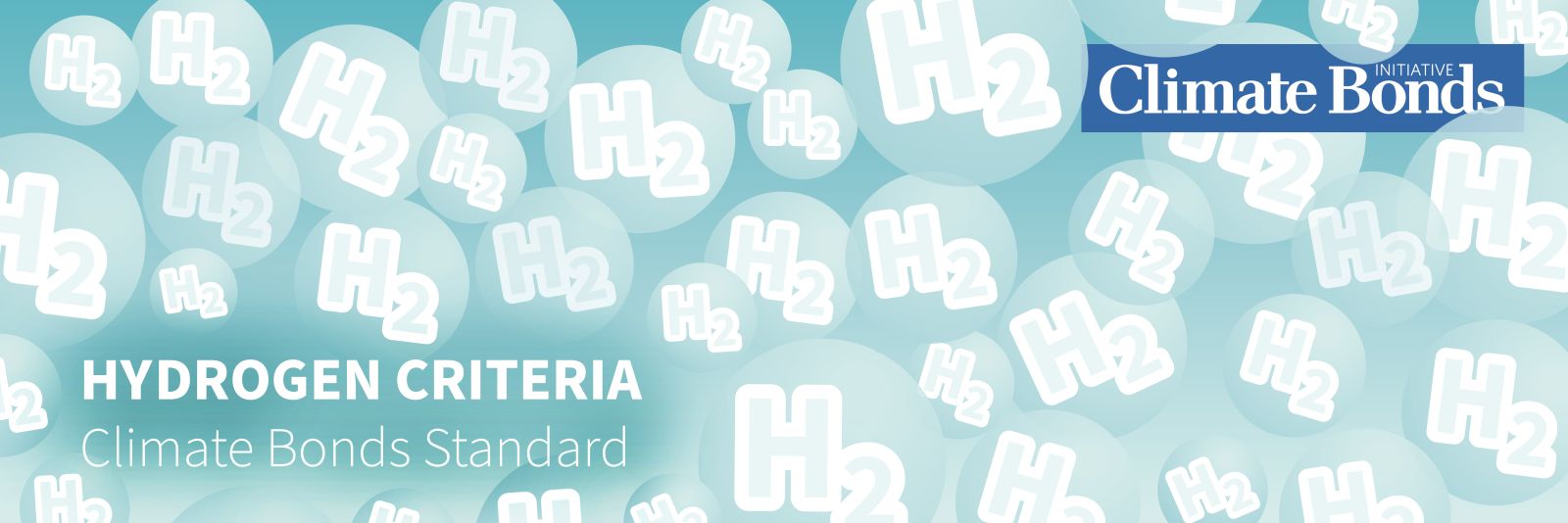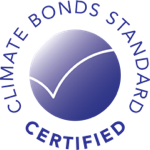
![]()
Documents for Certification:
- Hydrogen Criteria Document
- 氢气标准
气候债券标准和认证计划 - Background Paper
- Hydrogen Criteria Brochure
- Critérios de Hidrogênio (Portuguese translation)
- Criterios de Hidrógeno (Spanish translation)
Timeline of Development:
May 2022: TWG Launch
8 Sept- 28 Oct 2022: Public Consultation
Nov 2022: Hydrogen Production Criteria Available for Certification
Aug 2023: Hydrogen Production & Delivery Criteria Open for Public Consultation
Dec 2023: Criteria Published for Certification under the Climate Bonds Standard.
Visit our Database of Certified Bonds Database for full list of Certifications.
Status: Climate Bonds Hydrogen Production and Delivery criteria are now available for Certification, expanding the scope of the Criteria from Hydrogen Production to Hydrogen Delivery Infrastructure.
The hydrogen production criteria were launched in November 2022 using an emissions intensity approach to define low-carbon hydrogen. These criteria were focused on projects, measures and infrastructure relating to hydrogen production. Now, the Climate Bonds expands the criteria to certify hydrogen delivery projects.
Hydrogen delivery projects and infrastructure, from production assets to end-users, are critical parts of the value chain. Because of the low volumetric energy density of hydrogen at ambient conditions, transporting and storing it requires high amounts of energy. The emissions reduction potential of hydrogen as an alternative fuel to decarbonise some sectors of the economy can be eclipsed when delivered using energy intense alternatives. Therefore, ensuring a clean delivery pathway is required to keep consistency with a low-carbon production process. Overlooking delivery technologies can become a barrier to deploy the hydrogen market and decarbonise some sectors of the economy.
Financial instruments (bonds and loans) linked to these eligible assets, activities and entities will be aligned with the Paris Agreement and the goal of keeping global temperature rises to no more than 1.5oC above pre-industrial levels.
Why develop eligibility Criteria for hydrogen investments?
Hydrogen is experiencing unprecedented momentum as a sustainable fuel and feedstock, offering a huge opportunity to replace fossil resources and contribute to the decarbonisation of the economy. Hydrogen production requires high amounts of energy. Most of its production today is based on the cheapest alternatives: natural gas steam reforming and coal gasification. These production pathways have a high carbon footprint, hence making hydrogen production more sustainable is essential to contribute to decarbonisation of the economy
Standards and certification mechanisms will play an essential role in the hydrogen market evolution. Establishing global criteria will foster a level playing field and offer more confidence to investors. Promoting green investments across the whole hydrogen value chain will be essential to develop the hydrogen market.
Key Components of the Hydrogen Criteria
The Hydrogen Criteria apply to eligible assets, projects, decarbonisation measures, and entities relating to the production, conditioning, conversion, transportation, and storage of low-carbon hydrogen. It covers activities across the hydrogen value chain, except for end-uses, which are part of each end-use sector criteria.
The Hydrogen Criteria framework is designed to achieve three key outcomes:
Identifying Eligible Assets and Projects: The criteria set the stage for identifying assets and projects related to hydrogen investments that have the potential to be included in Certified Climate Bonds. This essential step ensures that only projects contributing significantly to emissions reduction and sustainability are considered.
Deploying Eligibility Criteria: The framework deploys specific eligibility criteria under which assets and projects are assessed for their suitability for inclusion in Certified Climate Bonds. This step ensures that only projects that adhere to the highest environmental and social standards are eligible for certification.
Establishing Metrics and Tools for Monitoring: To ensure ongoing compliance, the Hydrogen Criteria also outline the necessary metrics, methodologies, and tools for measuring and monitoring assets' and projects' alignment with the eligibility criteria. This aspect ensures transparency and accountability throughout the investment lifecycle.
Tailored Approach for Different Financial Instruments.
The Technical and Industry Working Groups (TWG and IWG)
To create the Criteria, we convened a Technical Working Group (TWG) with representatives from academia, public entities, research institutes and international policy bodies from around the world. These experts ensure a robust pragmatic criteria is developed. Later, an Industry Working Group (IWG) was convened with industry experts to review the TWG's draft criteria and provide advice.
The Hydrogen Criteria Technical Working Group Members
 |
 |
 |
 |
 |
 |
 |
||||||||
|
Technical Lead: Hydrogen Criteria MIT Energy Initiative |
Clarissa Bergman Fonte University of Rio de Janeiro |
Gabriele Nascimiento da Silva KfW (Development Bank of Germany) |
Guiseppe Bianchi Independent Consultant, Professional in Decarbonisation |
Gniewomir Flis
Energy Revolution Ventures |
Graeme Sweeney European Technology Platform of Zero Emission |
Joe Powell Independent Senior Consultant |
||||||||
 |
 |
 |
 |
 |
 |
 |
||||||||
|
Marta Lovisolo Bellona Europe |
Narayan Kumar TERI |
Patrick Molloy RMI |
Rachel Fakrhy Race to Zero UNFCCC |
Zainab Datti GIZ |
Zaffar Hussein Agora Energiewende |
Maria de los Angeles Valenzuela HINICIO |
||||||||
 |
||||||||||||||
|
Marian Rodriguez Climate Bonds Sustainability Analyst Coordinating the Process |
